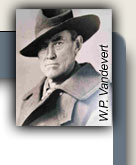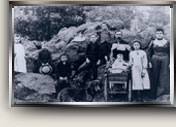THOMAS CLARK LETTER OF AUGUST 7, 1902
ON EARLY OREGON DAYS AND THE CLARK MASSACRE
EDITOR’S INTRODUCTION
Thomas Clark (born 1816 in England) brought his mother, two brothers Charlie and Hodgson, and two sisters with him on an ill-fated trip over the Oregon Trail in 1851. In 1902 he wrote a letter to a Mr. T.A Wood in Oregon seeking a pension for his service in the Rogue River Indian War of 1855. He followed up that letter with a second letter (below) that describes his first arrival in Oregon, two trips on the Oregon Trail, and his early days in California. The stated purpose of this second letter is to seek compensation for the horses that were stolen by Indians in the so-called Clark Massacre on the Oregon Trail in 1851 but it appears that Thomas also very much wanted to set down his history in writing.
Whoever typed up Thomas’s letters noted on them that the letters were hard to read. All the blanks and parentheses in the letter below are those of Thomas Clark or whoever typed the letter up except the comments specifically noted as inserted into this electronic copy by the editor (i.e. the editor of the Vandevert Ranch website). The typed-up version of the letter was provided by Grace Vandevert McNellis, granddaughter of Thomas Clark’s sister, Grace Clark.
Port Hueneme, Ventura County, California
August 7, 1902
Mr. T.A. Wood
I have written considerably about things that has nothing to do with Pensions, but I want some other business attended to if anything can be done about it and I commence by giving you a brief history about my first coming to Oregon. In the year 1845 (more likely 1848 – see inserted comments below. – editor), I started across the Plains for Oregon from near Jacksonville, Ill. With a family named Hooker who took up claims in Polk County in the forks of the Lucka___ and Rich (?) Road near Dallas. (Polk County and Dallas, Oregon are just west of Salem. – editor) In the Company was a Mr. John Purvine and family also from Illinois and others named Coffey (Goffey?) Holmes, Tuckers, and Porters who took up land in Marion County (includes Salem and land east of Salem – editor).
We crossed the Mo (Missouri) River at St. Jo on the Platte River. We met Joe Meek (younger brother of Stephen Meek of the infamous Meek Cutoff – editor) on his way to Washington (Washington D.C. – editor) to get help to put down the Cayuse Indians. He also told me of the discovery of gold in California. (California gold was discovered January 24, 1848. – editor) We had a very good trip and arrived at Foster’s in October where we separated (Foster’s store and farm, now an historical site near Estacada, Oregon, was founded in 1847 at the end of the Barlow Road, built in 1846. – editor) Hookers went to friends near Dallas named James. Berry Riggs, Purvines, bought out Mr. Ben Simpson at the lower end of French Prairie. Myself and a man with me contracted to put in a crop for John Ford near Salem. We was there two months, put in 96 acres wheat. We then went on a visit to our Emigrant friends, then down to Oregon City. After stopping there a few days, we hired to go down to work at a sawmill call Hunt’s Mill at $1.10 per day (we thought we was getting rich). While there, I went down with Mr. Martin, the boss, to Clatsop after vegetables and food for the oxen. While at Astoria, I met a Mr. Pratt at a Col Adair’s house. He was sent on by Government to fill the Office of Judge or something, I have forgotten. I worked at the mill 2 months. While at work there, the returning of goldseekers came up on the Vessel Malek (?) Adel Captain Crosby (Certainly the Malek Adhel, a brig captured by the U.S. Navy in 1846 in the Mexican-American War and sold by the navy in 1848. The ship called twice in San Francisco in 1848 – editor) and showed their gold dust and the mill shut down.
We went back to Oregon City and began making preparations to start overland to California. We had a horse apiece and we bought two other pack horses and started with others about the first of May (presumably 1849 – editor) arriving at Redding Springs (near Shasta City) on the 15 May. We (my comrade and I) mined there about 5 weeks. (The “comrade” was Joshua Jackson Vandevert. – editor) I left there to meet my brother (James – editor), found him on the American River where I was taken sick. When well enough to travel, went down to Embarkadero (near Sacramento City) paid $30.00 on the Steamer Senator to San Francisco. Paid $200 passage on the sailing ship Palmetto, Captain Rich. 54 days to Panama, 4 days on the Isthmus to Glagres (sp.) (Chagres? – editor), 10 days to New Orleans, 10 days to St. Louis, 2 days home. I had intended to start back with my folks but it was too late to get ready, so I made preparations to start the following Spring. Before starting in 1851, I ordered 12 horsepower thrashing machine, also a McCormick Reaper and a mower combined to be shipped around the Horn.
We started latter part of April 1851, 5 wagons. Our Mother, 2 brothers, 2 sisters, one of them married, and 17 head of good mares (first class) and some cattle. Also 1 other families, one of the named Gerry Evans. The last I heard from Evans, they was located in Portland, Oregon, running a dairy in about 1880. I think they are near there yet.
In crossing the Plains in 1851, I fell in with a gentleman and his wife with a 2 horse oversized ___ wagon bound for Oregon. He had a man driving 2 cows behind. They was considerable trouble and hindrance to him. I caught the cows.
We had a good trip until we got about 40 miles below Fort Hall on Snake River when the Indians attacked us killing my Mother and one Brother (Hodgson – editor) and shooting my Sister (Grace – editor) through the body. She got well and they drove off all our horses but one, as well some horses belonging to a widow named Huffman who was traveling with us. We got some assistance from other Companies, David Newsome, Willobly Churchill, Wilsons and others. We got along tolerably well after.
I met my brother (James – editor) from California about 30 miles east of The Dalles (near or at the mouth of the John Day River - editor) and he told me that a Mr. Olney had some large fat oxen for sale. We bought 8 head for $900 and gave our note to be paid to his brother in Portland, Judge Olney. We got to Pleasant Hill, Lane County located about 10 miles further up on the Coast Fork and in 1857, moved to Humboldt County, California. When we got through to the Valley, my brother from California had money deposited in Portland and I went and got it and looked up Judge Olney and who should it be but Judge Olney that I had bought the cows (?) from on the ____? I was well acquainted with him after that. I knew Nate Olney in just the mines. (Cyrus Olney came to Oregon in 1851, practiced law and became a judge. His brother, Nathan Olney, became the first resident of The Dalles in 1847. – editor)
In the Spring of 1852, I received a letter from Mr. Lot Whitcomb stating that there was some machinery to my address in Portland at the warehouse of Allan McKinley & Co. I wrote him that I would come down as soon as possible but that I wanted to sell the machines as the Indians had driven my horses. When I got down to his place in Milwaukie after talking awhile, he told me he had sold the thresher and the separator to a man named David Miller on the Santiam, but that he was going to thresh in the French Prairie. We sold it for $500 which was very satisfactory and on my way home I found him threshing and doing good work.
I sold the reaper to a man named Reece (?) for $350. He went to Portland after it and he did good work with it, and that was the first thresher and separator and reaper ever was on this coast. A gentleman named Lewis was in charge of the warehouse. I was well acquainted with him after this.
I knew Dr. McLaughlin (known as the “Father of Oregon” – editor), Governor Abernethy Curry (?) (George Abernethy and George Curry were provisional governors of Oregon before it was a state. – editor), and when I was first in Portland, the only store was in a building 12 x 22 ft starting where the first ferry landing was—sold tobacco and granaries (?) in the winter of 1848.
In the Fall of 1852, we exchanged some of our cows for Beef Steers and our Oxen being fat myself and Brother drove them to California and sold them at a high price and I went back to Illinois and bought more cows and Heifers and 16 large good Mares. I also sent on another Thresher and a Reaper and Mower Combined McCormick make. We got across the plains all right in ’53. We left the Old road and followed up the Malheur River. We followed the Old Sam Meek route most of the time. (Actually the Meek Cutoff disastrously pioneered Stephen Meek – editor) When we got to the Deschutes, we crossed the Cascades south of the 3 Sisters. It was rather tough getting through to the Willamette Valley. My nephew Robert F. Clark came with me on that trip. We ran the reaper and the thresher 2 seasons in Lane County and in 1856, I sold the Thresher and took $700 in Scrip in part pay to Mr. George Armitage. He put in forage and stock for the use of the Volunteers (volunteers in the Rogue River War, one of whom was Thomas Clark – editor) and proper Officers made out the Scrip. I took $690 about, in Scrip from him given for property turned into the government same as the others.
General Jo Drew took my Discharge and Scrip to collect and it was a long time before I got anything, but in the Spring of 1864, I was traveling from Sacramento to Portland to visit (?). Met Mr. Draw (Drew? – editor) in Portland and he told me he had collected pay for my services also for mules I turned in for use by the Volunteers but he said that he had not acted on the Scrip and that is the last I have heard of it. He told me the Discharge and Scrip was still in the hands of the Third Auditor (Falkner) in Washington. I wrote to my Nephew R.F. Clark that if he collect it he might have it and that is the reason that I have tried to explain it to you so that if you thought you could collect it for him you might make some sort of an agreement with him about it.
I would very much like to get something for the Horses the Indians drove off.
Yours,
Thomas Clark
There is a man Lewis Linaberger (?) was in the war in Southern Oregon. His address in Santa Paula (?), Ventura County, California. Also a Widow Arnold whose husband was in the Wars in California and Oregon about that time. (Presumably the “Snake Conflict” 1864-1868 and the Modoc War 1872-1873 - editor) Her husband was P.M. (Postmaster? – editor) at Hueneme and his P.M at this time (his son).
|






